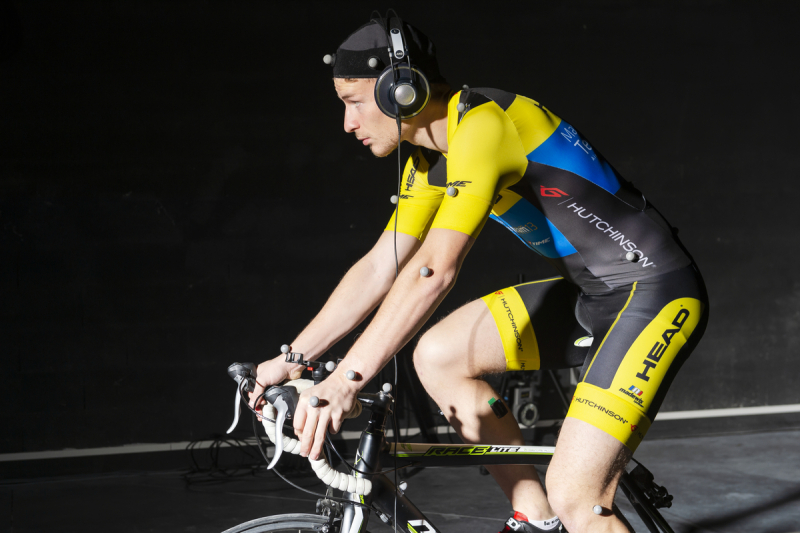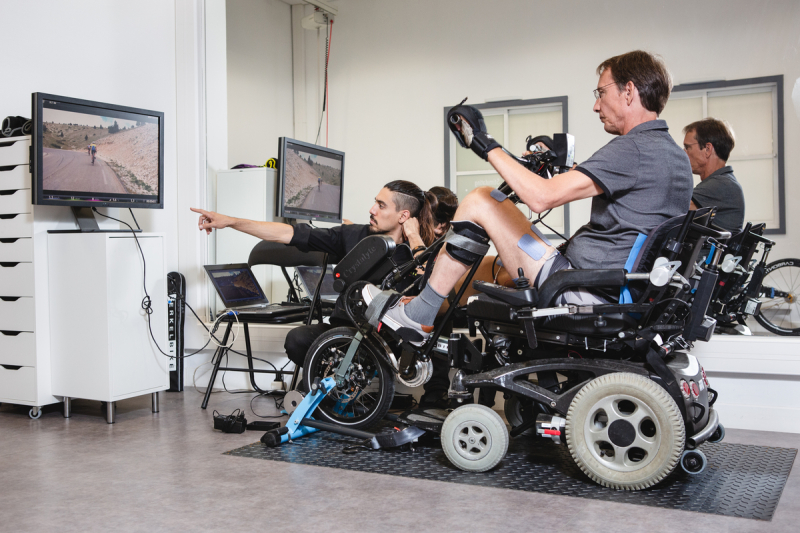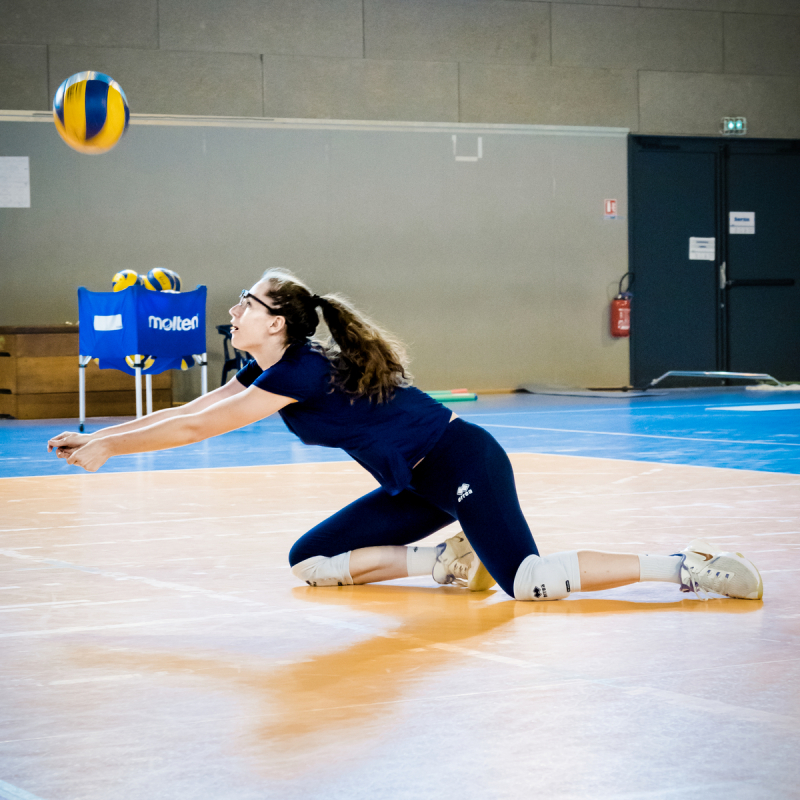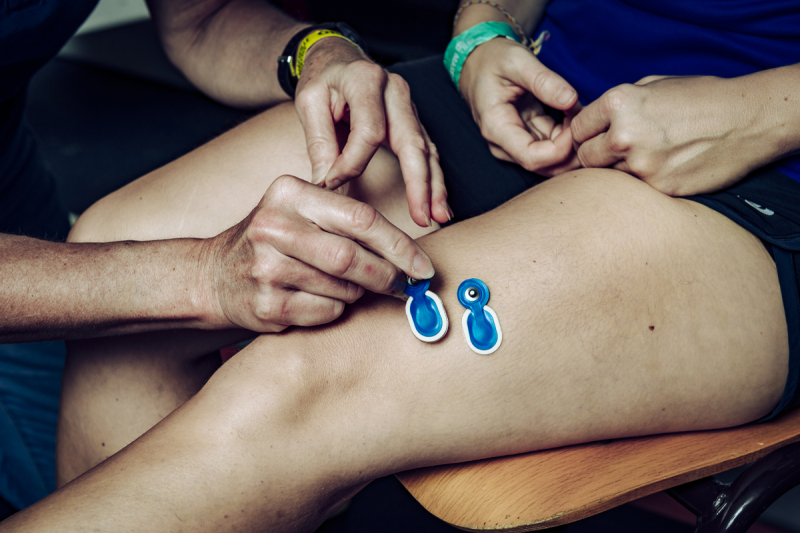
Sports science: the CNRS is leading the field
The CNRS's Sport and Physical Activity Research Network held a conference on December 6th 2023 to take stock of its work almost five years on from its launch. This was an opportunity to report back on the state of the art in sports science six months before the Olympic and Paralympic Games to be held in Paris.
What do competitive swimming, sports referees or umpires and table tennis have in common? All are or have been the subject of a thesis funded by the CNRS in the framework of the Sport and Physical Activity (French link) Research Network (GDR for groupement de recherche) set up in 2019 and soon to be renewed for a further five years. Like all our GDRs, this network promotes exchanges between CNRS scientists, our academic partners, companies and other sports science stakeholders. On December 6th 2023, the GDR's members took stock of its work in the past five years or so and looked ahead to the coming five. Its launch was instigated by Alain Schuhl, the CNRS's Deputy CEO for Science, and it now has 1250 members, 350 of whom are from laboratories under CNRS supervisory authority. The network produced 16,000 international publications between 2013 and 2018, the 'Culture Physique' series (French link) TV series created in partnership with the Franco-German Arte channel and the 'Sport & science, l'union fait la force' (French link) (Sport & science, strength through unity) mural installed in the corridors of the Montparnasse-Bienvenüe Parisian metro station in 2023. All things considered, and as one conference participant summed matters up, "the Sport GDR has more than fulfilled its mission of driving the scientific community".
This was indeed its initial mission. As Martina Knoop, the director of the CNRS Mission for Transversal and Interdisciplinary Initiatives (Miti)(French link), explains, this GDR was set up in response to the "dispersed nature of sport science whose community members belong to multiple institutions". With the 2024 Olympic and Paralympic Games in Paris looming, it has become "essential to set up systems for meetings and interactions like this GDR" to organise research in the run-up to the Olympics. The Sport GDR was initially under the supervisory authority of CNRS Engineering with financial support from five CNRS Institutes1 and clearly works within what is very much an interdisciplinary context. Interestingly, the sport and physical activity science community tends to be primarily university-based but CNRS staff members nonetheless play a very active, although minority role. In fact, by taking the lead in coordinating this scientific community, "the CNRS is fulfilling its public service mission by coordinating the wider scientific community", explains Vincent Nougier, the project leader for sport at the CNRS and director of the Sport and Physical Activity GDR.
- 1CNRS Engineering, CNRS Mathematics, CNRS Physics, CNRS Humanities & Social Sciences and CNRS Informatics.

Leadership and structuring for sport and physical activity sciences
The different events organised by the GDR and supported by the Miti include webinars, annual days, national conferences and taking part in the Sport Unlimitech exhibition and forum (French link). 22 theses on sport have also been funded and the PhD students' work was spotlighted on December 6th. One of these was Robin Macchi, a doctor in neuromuscular physiology at the CNRS and currently a post-doctoral fellow at the National Institute of Sport, Expertise and Performance. In 2022 he defended his thesis from the Étienne-Jules Marey Institute of Movement Sciences1 . Its subject was the influence of gender on the kinetics of structural and functional recovery for athletes in very long ultra-trail races with gradients. He himself is a keen sportsman and much "appreciated being able to quantify performance" for his PhD. He considers this work to be something of a "passion" as "physical activity is a highly motivating research field".
In practice, sport research is such a motivating subject that it is characterised by high thematic and disciplinary heterogeneity. Martina Knoop explains that "the CNRS has multiple approaches, laboratories and scientists working on sport and physical activity sciences which are thus part of a very lively ecosystem of disciplines. The questions covered range from physiology and psychology to more technical or technological research 'instrumentation' issues and from economics and sustainable development questions to work on how to age well". The GDR has organised its community around four main areas to drive and support this diverse proliferation of research - human performance factors; modelling, materials and instrumentation; sport, physical activity, health and well-being, and finally societal issues. There are also three transversal themes - disability, age and gender.
- 1CNRS / Aix-Marseille Université.

Top-level sport - an ambivalent scientific subject
Vincent Nougier considers that this scientific clarification drove "the political decision to instigate the Very High Performance Sport Priority Research Programme (PPR) (French link) by offering a spectrum of research as this had previously been a difficult issue for decision-makers to comprehend fully". This PPR was the first on sport and was officially launched in spring 2019. It received funding to the tune of €20 million from the French General Secretariat for Investment. This was ten times more than the usual sum allocated to such research because of the 2024 Olympic Games to be hosted by France. Its explicit objective is to drive and involve the scientific community to respond to the requirements of top-level athletes (French link) striving towards the highest performance levels. To achieve this, twelve winning projects were selected following two calls for projects with study subjects ranging from swimming to physical and mental preparation or Paralympism (French link). Even before we find out how many medals the French delegation wins this summer, Vincent Nougier, who is also leading the PPR for the CNRS, is already delighted to note how much this programme "has accelerated the creation of relationships of trust with sports federations". And in fact the PPR will have facilitated the transfer of tools and methods to other fields like sport and health, however many French medal-winners there are.
The renewal of the GDR and the scheduled expiry of PPR in 2024 have brought up the question of the future of sport science. In the short term, the upcoming Olympic Games are polarising views among researchers in this field. Many scientists worry support and funding will be reduced after the Olympics, whatever the French delegation's results. Vincent Nougier takes a nuanced view of how science aligns with the high-profile Olympic Games in Paris: "The Olympics have undeniably highlighted scientific issues surrounding sport and physical activity and also led people to focus on top-level sport. However, there's less focus on general issues like sustainable development and sport for health at a time when the French population's overall physical condition is declining". The CNRS project leader for sport fears the same could occur again with the 2030 Winter Olympics. The French Alps region's bid to host these games is already underway and he thinks this second event "will maintain the funding for top-level sport with all the biases that derive from this and to the detriment of sport for health" (French link).

Towards new research areas
Sport for health (French link) was the phrase on everyone's lips on December 6th. Many of those involved advocate the focus being "shifted" towards this issue rather than performance sport which is already over-represented. Many also called for research to be promoted and supported into the links between sport and cancer, obesity, sedentary lifestyles (French link), ageing and so forth. Other transversal themes are emerging such as the relationship between sport and sustainable development, for example. Anne-Sophie Crépeau is a PhD student in the sociology of sport at the CNRS's Environments, Dynamics and Mountain Territories laboratory1 . Her thesis deals with this issue, more specifically focusing on the adaptation of mid-mountain nature sports practices to climate change. She previously worked for a mid-mountain tourist office in the Vercors Natural Park with a strong focus on nature sports and noted "the issue of global warming becoming increasingly present" in her job. She interviewed the organisers of canyoning and potholing activities, for example, which showed her that some are very "avant-garde and pioneering in their ways of minimising the environmental impact of their activities" (French link). By logical extension she also defined the extent to which her own research could be of interest to nature parks, service providers and nature sports federations.
Vincent Nougier remains optimistic given all the new research that is emerging and also because he views the Olympics as "a springboard for promoting sport for health and a culture of physical activity in everyday life and not just of sport".
One thing is sure. Medals at the Olympics or not, sports science will continue running its own marathon.
- 1CNRS / Université Savoie-Mont-Blanc.



